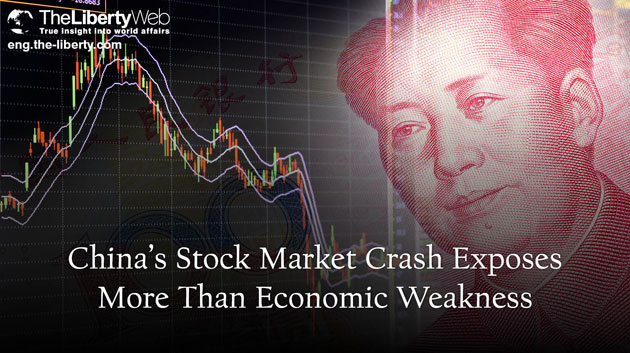China’s Stock Market Crash Exposes More Than Economic Weakness
Article Primary Points:
- Stock Market Crash revealed an economic slowdown
- Stock Market Crash will expose its command economy
- Stock Market Crash will expose its hegemonic ambitions
Merely 2 weeks into 2016, the world of politics has caused a huge stir, with Saudi Arabia and Iran breaking off diplomatic relations, and North Korea conducting another round of nuclear tests.
The world economy is in a similarly chaotic state. The sharp decline in China’s stocks is all over the news. Chinese stocks saw similar decline during the middle of last year, and the current rate of decline of China’s stocks is coming very close.
Companies that export to China are expected to see their profits decline, leading to lower stock prices in nations, such as Japan, that have such companies.
Stock Market Crash Reveals An Economic Slowdown
What were the trigger and root causes for the decline of Chinese stocks?
The trigger was the statistics published on the 4th of December 2015. It became evident that the steel and shipbuilding industries experienced a slowdown for 10 consecutive months (according to Chinese manufacturing report on business). Taken aback, panic-stricken investors began to sell their stocks.
The root of the problem is that the Chinese economy at large is experiencing a slowdown. Trade is what supports the Chinese economy, and last year’s decline in trade volume was enough to remind many of the Lehman Shock. Investors, who had always thought that stocks were far too expensive in relation to the poor economic conditions, decided it was time to sell their stocks after seeing the reports.
The sharp overnight drop in Chinese stocks is reflective of the bursting Chinese stock market bubble.
Stock Market Crash Will Expose China’s Command Economy
Another point of focus was the Chinese government’s response.
The Shanghai stock exchange triggered its “circuit breaker” to halt trading for 15 minutes in order to let investors calm down. This in itself is not unusual, but what was unusual was the Chinese government’s response to this event.
The government thought that the trade halt would in fact make investors more anxious, thus inviting them to sell their stocks. As a result, the government withdrew the circuit breaker system.
One would probably have thought that ‘China is not a command economy as stocks were being traded freely like they are in Japan’. In reality, however, China is a command economy, where the government can change the rules of the game on-the-fly whenever inconvenient events occur.
If chaos – like this decline in stocks – ensues in China this year, there will be more opportunities where the ‘commanded’ nature of the economy will be exposed.
Stock Market Crash Will Expose China’s Hegemonic Ambitions
Chinese hegemony will begin to assert itself as China’s economy hits a wall.
There is no source for wealth creation inside China, and as that becomes apparent, people will begin to seek sources for wealth outside of the country. Unfortunately, the preparations are well underway.
Hidden behind the ‘infrastructure investment’ touted by the AIIB is its real intention of gathering labor from overseas, while China’s military expansion is designed to steal resources from other countries. Tibet, now annexed, was forced to support the Chinese economy with its timbers and minerals.
The world is entering an era where its various problems can no longer be ignored. Tackling these problems will require many to shape their understanding of justice.



















